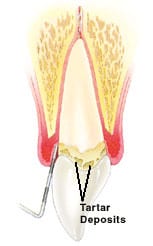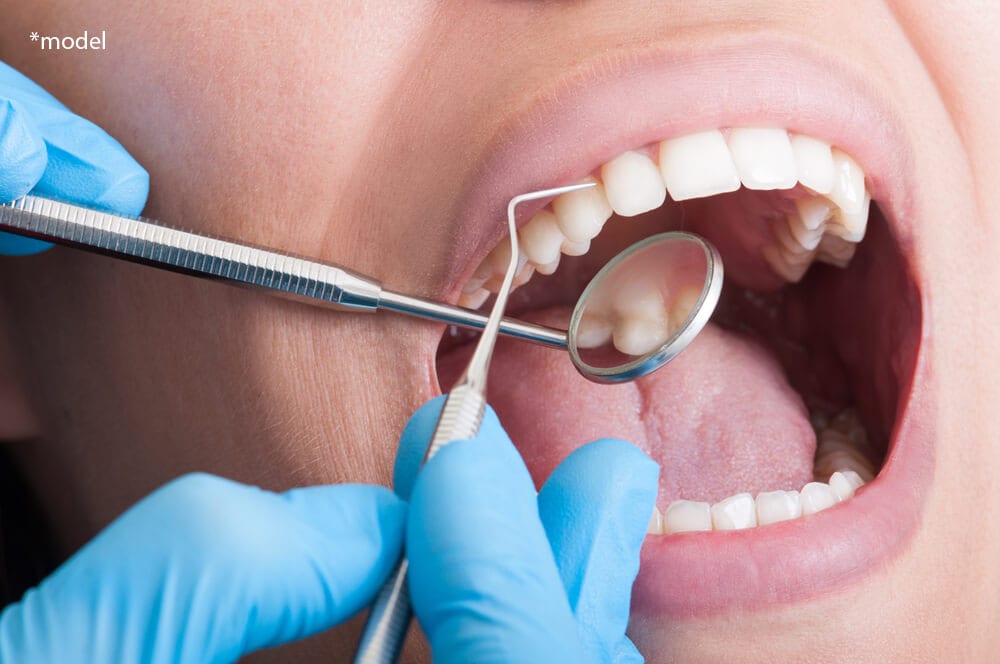Periodontal Scaling and Root Planing in Los Angeles

Shallow Pockets Mild Tartar Deposits
Periodontal scaling and root planing are performed for the deep cleaning of the spaces between the gums and teeth. This is often the first stage of treatment for periodontal disease. Scaling and root planing remove plaque and tartar deposits beneath the gum line that can spread and worsen to form periodontal pockets.
While a standard cleaning will address the surface of the teeth, only scaling and root planing can reach the deeper areas beneath the gums to maintain a healthy mouth.
Why Do Plaque and Tartar Develop?
Healthy gums hug the tooth tightly. When plaque and tartar develop, the gum tissues become inflamed and loosen, allowing the bacteria to spread beneath the gums. This can result in bone loss and pocket formation, which is the first stage of periodontal disease.
Plaque is a bacterial buildup from saliva, proteins, and food. The bacteria form a layer over your teeth. When plaque is not removed, it hardens to become tartar. Plaque and tartar can lead to tooth decay and gum disease when they are not adequately removed with at-home oral care, standard cleanings, and deep cleanings like scaling and root planing.
How Do Scaling and Root Planing Help?
Scaling and root planing are performed to rid the mouth of plaque and tartar that cause pockets around the teeth and lead to periodontal disease. This treatment smooths the tooth and root beneath the gum so that the gum tissues can reattach to the tooth.
Sometimes, when bacterial growth has already spread and caused deep pockets, additional surgical procedures or non-surgical therapy is required to restore oral health.
How Are Scaling and Root Planing Performed?
Scaling and root planing (deep cleaning) is performed for patients with excessive plaque and tartar buildup and gum disease.
Local anesthetic is used to numb the gums if they are sensitive.
Scaling uses a thin tool inserted beneath the gum line to access plaque and tartar that brushing and flossing cannot reach.
Root planing reaches deeper beneath the gums to address any buildup on the tooth root. Plaque and tartar are gently scraped away to smooth the surface, allowing the gums to reattach correctly.
What Can You Expect After Your Treatment?
Your gums may feel sore and sensitive after your scaling and root planing treatment. This is normal and will lessen within a couple of days if present.
How Can You Maintain Your Oral Health?
Many patients do not require additional treatment—surgical or non-surgical—following scaling and root planing. All patients will require ongoing dental care and periodontal disease maintenance to sustain their oral health.
Patients must follow good at-home oral care practices, including brushing and flossing, so that new bacteria do not result in additional growth.
Occasionally, additional treatments may be necessary to maintain oral health. These include:
Systemic Antibiotics
System antibiotics are taken orally to fight any infections caused by bacteria in the mouth. These are often prescribed after scaling and root planing procedures.

Deep Pockets Heavy Tartar Deposits
Local Delivery of Antimicrobials
This therapy delivers antimicrobials (substances that prevent the growth and spread of bacteria) directly into the periodontal pocket. This treatment reduces or eliminates periodontal bacteria.
Occlusal (Bite) Adjustment
Occlusal adjustment may be required if there are interferences with the closing and coming together of the teeth. This therapy restores the bite so that it can function without damage.

